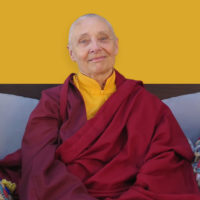What we need is to be interested and to watch, but not interfere or be caught up in what we are thinking. Don’t think of the past, don’t anticipate the future, don’t get fascinated by the present. See it as it is. Just be there with it. A thought is just a thought. An emotion is just an emotion. It is like a bubble. It will burst and another one will come up.
When we first begin to put this into practice the mind begins to split. We develop what is called the observer, the witness, the knower. This is an aspect of the mind. It is still just mind, conceptual mind, but it is a mind which is standing back and looking at what is going on, as if at a distance. In itself, this is not ultimate reality, because it is still a dualistic mind. But it is a vast improvement on the way we normally think, because it gives us the space to see a thought as a thought and an emotion as an emotion. Then we can decide whether this is a useful thought or emotion or not. We know it for what is, rather than being absorbed in it. We no longer identify with it.
If we develop this inner awareness, which is like an inner space, we can ride the waves of life. People imagine that to be a meditator you have to always live in very tranquil situations and that you are likely to be inundated if a turbulent situation arises. This is true for beginners, just as it is for someone who is learning how to surf. At the beginning, they have to stick to the small waves otherwise they will be bowled over. But an expert surfer looks for the big waves. The greater the waves, the more fun, once you have your balance. The secret is to be balanced, to be poised. To be a good surfer you need to be neither too tense nor too relaxed, just balanced. This is what we need in our practice, too.
When we develop this inner space, everything takes on a dream-like quality. Not dream-like in the sense of being sleepy, but in that it is no longer so solid, so real, so urgent. It has a quality almost like an illusion. You don’t take it quite so seriously, because you are not so totally involved in it. Now when we have that sense of stepping back and seeing life with a degree of clarity, we are able to respond to situations which arise with freshness and spontaneity, instead of our usual automatic response, which is like pressing a button on a machine. We begin to respond naturally and in an appropriate manner.

Tenzin Palmo
from the book Reflections On A Mountain Lake: Teachings On Practical Buddhism
Read a random quote or see all quotes by Tenzin Palmo.
Further quotes from the book Reflections On A Mountain Lake:
- We never actually perceive what is there
- Cut off from the present moment
- No connection with that particular doctrine
- Being quite happy with a question mark
- We are awareness
- Beginning to develop awareness